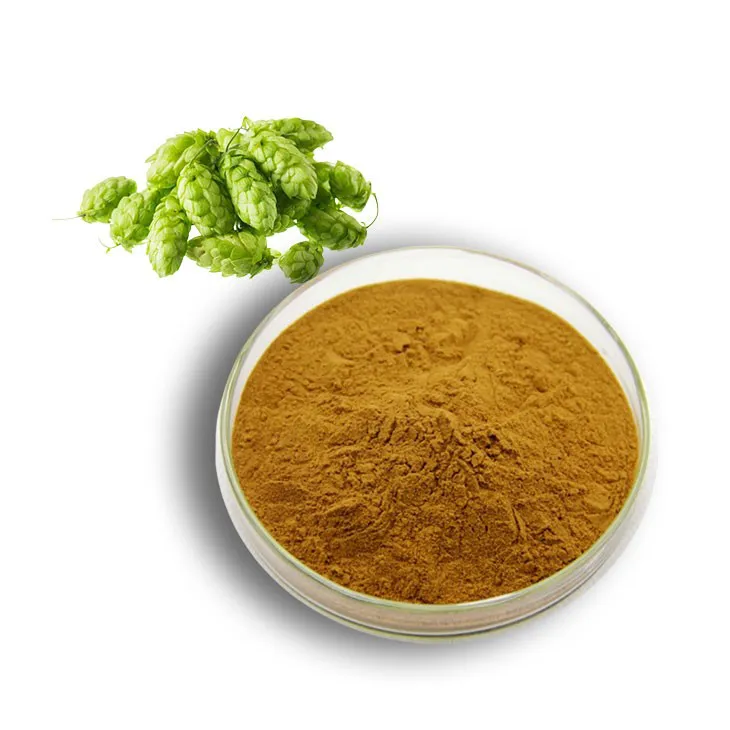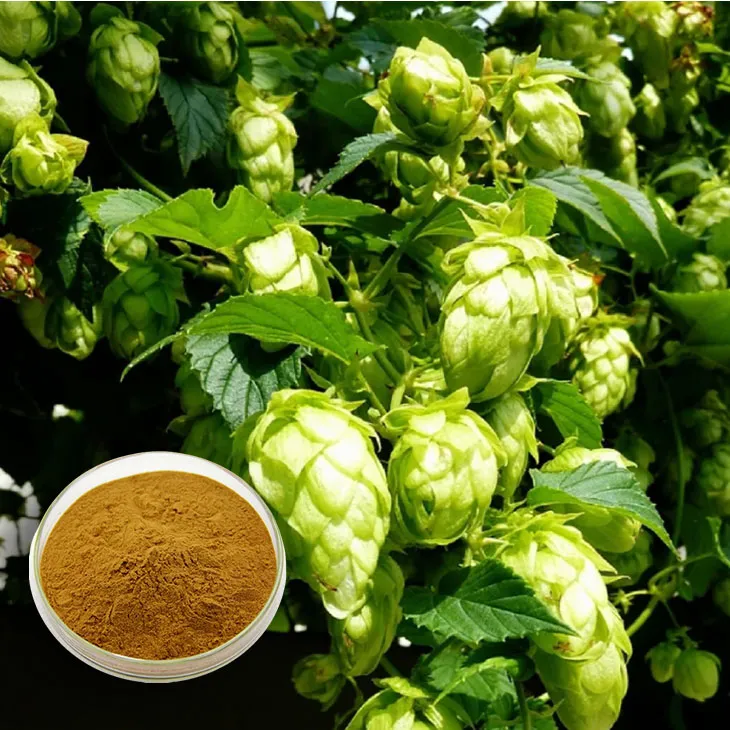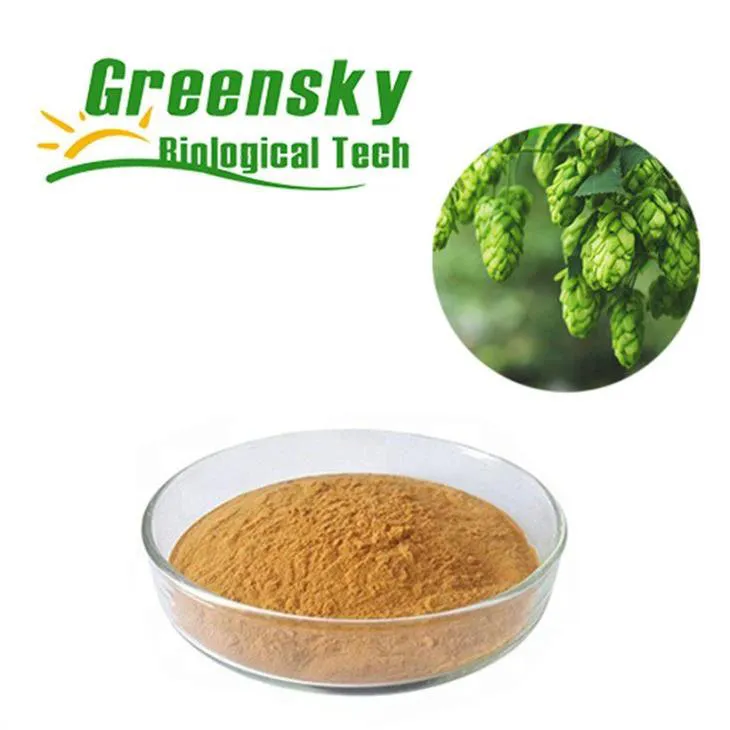- 0086-571-85302990
- sales@greenskybio.com
Hops extract: nature's best - kept secret.
2024-11-14

Introduction to Hops Extract
The Hops Extract is a truly remarkable and somewhat mysterious element that nature has bestowed upon us. It has long been an integral part of the beer - making process, yet its allure and significance stretch far beyond the brewing world. This natural extract is derived from the hop plant, Humulus lupulus, which is a climbing, herbaceous perennial native to many regions around the world.
In the context of beer production, hops are like the magic ingredient that transforms a simple malt - based liquid into a complex and flavorful beverage. However, as we delve deeper into the properties of Hops Extract, we will discover that its applications and potential benefits are as diverse as they are fascinating.

The Chemical Composition of Hops Extract
Alpha - Acids: One of the most important components of hops extract are the alpha - acids. These are mainly humulone, cohumulone, and adhumulone. During the brewing process, alpha - acids are isomerized (transformed) into iso - alpha - acids, which are responsible for the characteristic bitterness in beer. The level of bitterness can be adjusted by varying the amount of hops extract used in the brewing process. For example, a pale ale might have a moderate amount of hops extract to impart a balanced bitterness, while an India pale ale (IPA) often contains a larger quantity, resulting in a more pronounced and intense bitter flavor.
Beta - Acids: Beta - acids, such as lupulone, colupulone, and adlupulone, are also present in hops extract. Although they do not contribute significantly to bitterness in the same way as alpha - acids, they play other important roles. They have antimicrobial properties, which help in preserving the beer during the brewing and storage process. Additionally, beta - acids can interact with other components in the beer to influence its flavor and aroma in more subtle ways.
Essential Oils: Hops extract is rich in essential oils, which are the key to the floral and aromatic notes in beer. These oils contain a complex mixture of compounds, including myrcene, humulene, and caryophyllene. Myrcene is often associated with fruity and floral aromas, while humulene has a more earthy and spicy character. Caryophyllene can add a touch of clove - like or peppery aroma. The combination of these essential oils creates the unique and enticing bouquet that we associate with different types of beer.

The Role of Hops Extract in Beer - Making
Bitterness Regulation: As mentioned earlier, the isomerization of alpha - acids during the boiling stage of brewing is crucial for creating the right level of bitterness in beer. The longer the hops are boiled, the more alpha - acids are isomerized, leading to a more bitter beer. Brewers carefully control the time and amount of hops extract added during this stage to achieve the desired bitterness profile for their particular beer style.
Aroma and Flavor Enhancement: The addition of hops extract at different stages of the brewing process can have a significant impact on the aroma and flavor of the beer. For instance, adding hops late in the boil or during the fermentation process (known as "dry - hopping") can preserve more of the volatile essential oils, resulting in a more pronounced and fresh aroma. This technique is commonly used in modern craft brewing to create beers with intense and complex flavor profiles.
Stabilization and Preservation: The antimicrobial properties of beta - acids in hops extract help to keep the beer free from spoilage organisms. This natural preservative effect has been utilized in brewing for centuries, allowing beer to be stored and consumed over longer periods without the need for excessive chemical preservatives.

Hops Extract in Traditional Medicine
Historical Use: Hops have a long history of use in traditional medicine. In many cultures, hops were used to treat various ailments. For example, in European herbal medicine, hops were often used as a sedative or sleep aid. The relaxing properties of hops were thought to be beneficial for those suffering from insomnia or nervousness. This was likely due to the presence of compounds such as lupulone, which may have a calming effect on the nervous system.
Digestive Aid: Hops were also used to aid digestion. They were believed to stimulate the production of digestive enzymes and help soothe an upset stomach. The bitter compounds in hops may have played a role in promoting bile secretion, which is important for the digestion of fats.
Anti - Inflammatory Properties: Some traditional medicine practices also suggest that hops may have anti - inflammatory properties. This could potentially be related to the presence of certain polyphenolic compounds in the hops extract. However, more research is needed to fully understand the mechanisms behind these proposed anti - inflammatory effects.
Hops Extract in Modern Health - Related Research
Antioxidant Activity: Modern research has shown that hops extract contains a variety of antioxidants. These antioxidants can help protect the body's cells from damage caused by free radicals. Free radicals are unstable molecules that can cause oxidative stress, which is associated with various diseases such as cancer, heart disease, and neurodegenerative disorders. The antioxidant compounds in hops extract, such as flavonoids and phenolic acids, may scavenge these free radicals and reduce the risk of oxidative damage.
Potential Anti - Cancer Effects: There is some emerging evidence suggesting that certain components of hops extract may have anti - cancer properties. Some studies have shown that compounds in hops can inhibit the growth of cancer cells in vitro. However, it is important to note that these findings are still in the early stages of research, and more in - vivo and clinical trials are needed to determine if hops extract could be a viable treatment or preventive measure for cancer.
Metabolic Regulation: Hops extract may also play a role in metabolic regulation. Some research has indicated that it could affect lipid metabolism, potentially helping to lower cholesterol levels. Additionally, it may influence blood sugar levels, although more research is required to fully understand these effects and their implications for metabolic disorders such as diabetes.
Conclusion
The hops extract is indeed nature's best - kept secret. From its fundamental role in beer - making, where it imparts bitterness, aroma, and stability, to its historical use in traditional medicine and its emerging potential in modern health - related research, it is a substance full of surprises. As further research is carried out, we may discover even more about this fascinating extract and its many applications. Whether it's enjoying a delicious, hoppy beer or exploring the potential health benefits, the hops extract is sure to continue to intrigue and captivate us for years to come.
FAQ:
What is hops extract?
Hops extract is a substance derived from the hops plant. It contains various chemical components that are crucial in different aspects. In the beer - making process, it is responsible for providing the characteristic bitterness and floral aromas to beer. It is also being studied for its potential uses in other fields such as traditional medicine and modern health - related research.
How does hops extract contribute to the bitterness in beer?
The bitterness in beer from hops extract is mainly due to the presence of alpha - acids. During the brewing process, these alpha - acids are isomerized, which results in the formation of iso - alpha - acids. These iso - alpha - acids are what give beer its distinct bitter taste, and the amount of hops extract used can be adjusted to control the level of bitterness in the final product.
What are the floral notes in beer from hops extract?
The floral notes in beer imparted by hops extract come from essential oils present in the hops. These essential oils contain compounds like myrcene, humulene, and caryophyllene. When hops are added during brewing, these compounds are released and contribute to the complex floral, spicy, and earthy aromas that are characteristic of beer flavored with hops.
How has hops extract been used in traditional medicine?
In traditional medicine, hops extract has been used for its sedative and relaxant properties. It was often used to relieve anxiety, promote sleep, and ease digestive problems. Some traditional remedies involved using hops in the form of teas or tinctures. However, it's important to note that while these uses have a long - standing history, modern medical research is still exploring the full extent of its effectiveness and safety in a traditional medicine context.
What is the emerging role of hops extract in modern health - related research?
In modern health - related research, hops extract is being studied for potential anti - inflammatory, antioxidant, and anti - cancer properties. Some studies suggest that certain compounds in hops extract may help in reducing inflammation in the body, scavenging free radicals, and potentially inhibiting the growth of cancer cells. However, more research is needed to fully understand these effects and to determine if hops extract could be used as a therapeutic agent in the treatment of various diseases.
Related literature
- The Chemistry and Biology of Hops and Beer"
- "Hops: From Plant to Beer and Beyond"
- "The Role of Hops Extract in Modern Medicine: Current Research and Future Perspectives"
- ▶ Hesperidin
- ▶ Citrus Bioflavonoids
- ▶ Plant Extract
- ▶ lycopene
- ▶ Diosmin
- ▶ Grape seed extract
- ▶ Sea buckthorn Juice Powder
- ▶ Fruit Juice Powder
- ▶ Hops Extract
- ▶ Artichoke Extract
- ▶ Mushroom extract
- ▶ Astaxanthin
- ▶ Green Tea Extract
- ▶ Curcumin
- ▶ Horse Chestnut Extract
- ▶ Other Product
- ▶ Boswellia Serrata Extract
- ▶ Resveratrol
- ▶ Marigold Extract
- ▶ Grape Leaf Extract
- ▶ New Product
- ▶ Aminolevulinic acid
- ▶ Cranberry Extract
- ▶ Red Yeast Rice
- ▶ Red Wine Extract
-
Red Date Extract
2024-11-14
-
Mango flavored powder
2024-11-14
-
Sea buckthorn Juice Powder
2024-11-14
-
Artichoke Leaf Extract
2024-11-14
-
Beta Carotene
2024-11-14
-
Aminolevulinic acid
2024-11-14
-
Saponin Extract
2024-11-14
-
Eucommia Ulmoides Extract
2024-11-14
-
Alfalfa Meal
2024-11-14
-
Uridine-5'-monophosphate Disodium salt
2024-11-14





















